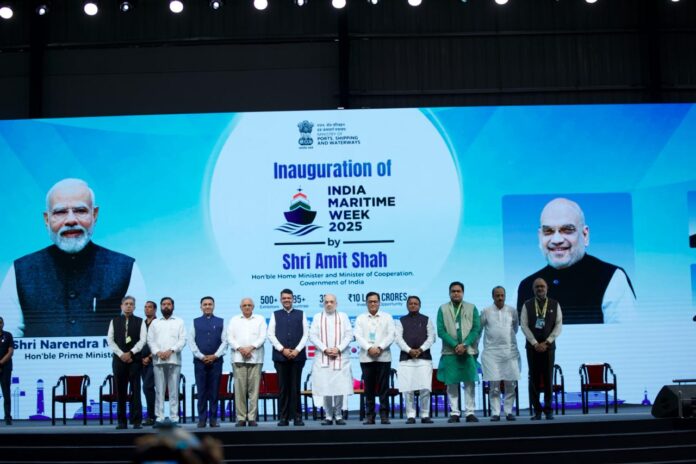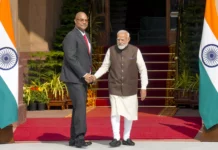MUMBAI: Prime Minister Narendra Modi on Wednesday attended India Maritime Week 2025 in Mumbai.
The Global Maritime CEO Forum, the flagship event of India Maritime Week 2025, will bring together CEOs of global maritime companies, major investors, policy-makers, innovators, and international partners to deliberate on the future of the global maritime ecosystem.
The Forum will serve as a key platform for dialogue on sustainable maritime growth, resilient supply chains, green shipping, and inclusive blue economy strategies.
The Prime Minister’s participation reflects his deep commitment to an ambitious, future-oriented maritime transformation, aligned with the Maritime Amrit Kaal Vision 2047.
This long-term vision, built on four strategic pillars — port-led development, shipping and shibuilding, seamless logistics, and maritime skill-building — aims to position India among the world’s leading maritime powers.
India Maritime Week 2025 serves as the Government of India’s premier global platform to translate this vision into action, bringing together leading stakeholders across shipping, ports, shipbuilding, cruise tourism, and blue economy finance.
Held from 27th to 31st October 2025 under the theme “Uniting Oceans, One Maritime Vision”, IMW 2025 will showcase India’s strategic roadmap to emerge as a global maritime hub and a leader in the Blue Economy. IMW 2025 will draw participation from over 85 countries, featuring more than 1,00,000 delegates, 500+ exhibitors and 350+ international speakers.
Meanwhile, Union Petroleum and Natural Gas Minister Hardeep Singh Puri on Wednesday announced that India is planning a major shift in its energy shipping strategy, building its own fleet of oil tankers to reduce the massive freight costs it currently pays to foreign vessel operators.
Speaking at India Maritime Week 2025 in Mumbai, Puri revealed that India’s three major oil marketing companies–Indian Oil Corporation, Bharat Petroleum, and Hindustan Petroleum–spend approximately USD 8 billion over five years on chartering foreign ships, an amount sufficient to purchase an entirely new fleet of crude-oil tankers.
The Minister highlighted a striking imbalance, while the oil and gas sector accounts for nearly 28 per cent of India’s total trade by volume, making it the single largest commodity group at Indian ports, only around 20 per cent of this cargo is carried on Indian-flagged or Indian-owned vessels.
“This challenge we are now turning into an opportunity,” Puri stated, outlining plans to significantly boost India’s maritime capabilities in the energy sector.
India’s energy import dependence remains substantial, with the country meeting nearly 88 per cent of its crude oil and 51 per cent of its natural gas requirements through imports. In the fiscal year 2024-25, the crude import bill alone crossed USD 150 billion. (ANI)
Also Read: India, Sri Lanka discuss new ferry route between Rameshwaram and Talaimannar







